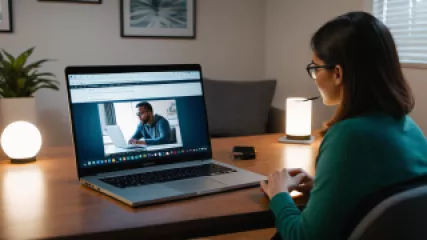How to Get the Most out of Cognitive Therapy Video Sessions
Welcome to this step-by-step tutorial on how to get the most out of cognitive therapy video sessions. In recent years, online therapy has become increasingly popular, offering individuals convenient access to mental health support from the comfort of their own homes. Cognitive therapy, also known as cognitive behavioral therapy (CBT), is a widely practiced therapeutic approach that focuses on identifying and changing negative thought patterns and behaviors. With the rise of video therapy sessions, it's important to understand how to optimize these virtual interactions to enhance the effectiveness of your therapy.
1. Prepare Your Space
Creating a comfortable and distraction-free environment is crucial for effective cognitive therapy video sessions. Find a quiet space where you can have privacy and minimize interruptions. Ensure that the lighting in the room is adequate, allowing your therapist to see your facial expressions and body language clearly.
Set up your device at eye level, using a laptop, tablet, or smartphone with a stable internet connection. Position the camera so that you are centered on the screen, creating a sense of engagement and connection during the session.
2. Test Your Technology
Prior to your scheduled therapy session, it's essential to test your technology to avoid any technical difficulties or interruptions. Check your internet connection to ensure it is stable and reliable. Test the audio and video settings on your device to make sure you can hear and be heard clearly.
If possible, use headphones with a built-in microphone to improve sound quality and reduce background noise. Familiarize yourself with the video platform being used for your therapy sessions, whether it's Zoom, Skype, or another secure and HIPAA-compliant platform.
3. Establish Rapport with Your Therapist
Building a strong therapeutic relationship is key to the success of cognitive therapy. Despite the physical distance, it's important to establish rapport with your therapist during video sessions. Begin each session by greeting your therapist warmly and expressing any concerns or goals you may have.
Engage actively during the session by maintaining eye contact, nodding, and using verbal cues to show that you are present and attentive. Remember, effective therapy is a collaborative process, so be open and honest with your therapist about your thoughts and feelings.
4. Set Goals and Track Progress
Work with your therapist to set specific goals for your cognitive therapy sessions. Whether it's managing anxiety, improving self-esteem, or overcoming a specific challenge, clearly define what you hope to achieve through therapy.
Regularly track your progress by keeping a journal or using an online therapy app. Documenting your thoughts, emotions, and behaviors can help you identify patterns and monitor your growth over time. Share this information with your therapist to facilitate productive discussions and tailored interventions.
5. Actively Participate in Therapy Exercises
Cognitive therapy often involves various exercises and techniques to challenge negative thinking patterns and develop healthier coping strategies. Actively participate in these exercises during your video sessions.
Your therapist may ask you to complete worksheets, practice mindfulness exercises, or engage in role-playing activities. Approach these exercises with an open mind and a willingness to explore new perspectives and behaviors. The more engaged you are in the therapy process, the greater the potential for positive change.
6. Practice Self-Care Between Sessions
Therapy is not limited to the time spent in video sessions; it extends into your daily life. Practice self-care between sessions to reinforce the concepts and skills discussed with your therapist.
Engage in activities that promote relaxation, such as meditation, deep breathing exercises, or engaging hobbies. Challenge negative thoughts by using cognitive restructuring techniques, such as reframing or positive self-talk. Take note of any improvements or challenges you encounter and discuss them with your therapist during your next session.
7. Communicate Openly with Your Therapist
Honest and open communication is vital in cognitive therapy. If you have any concerns, questions, or uncertainties about the therapy process, don't hesitate to share them with your therapist.
Discuss any difficulties you may be experiencing in implementing the strategies discussed in therapy, as your therapist can provide guidance and support in overcoming these challenges. Remember, your therapist is there to help you navigate your mental health journey.
8. Reflect on Your Progress
Regularly take time to reflect on your progress throughout your cognitive therapy journey. Celebrate your achievements, no matter how small they may seem. Acknowledge the changes you have made and the skills you have developed.
Reflecting on your progress can boost your motivation, reinforce positive changes, and help you identify areas where further growth is needed. Share your reflections with your therapist to receive feedback and guidance on your continued journey towards improved mental well-being.
Remember, cognitive therapy video sessions are a valuable tool for self-improvement and personal growth. By following these steps and actively engaging in the therapy process, you can maximize the benefits of online therapy for self-esteem and develop effective cognitive behavioral techniques to enhance your overall well-being.
So, prepare your space, test your technology, establish rapport, set goals, actively participate in therapy exercises, practice self-care, communicate openly, and reflect on your progress. Embrace the opportunities that cognitive therapy video sessions offer and embark on a transformative journey towards a happier and healthier life.






